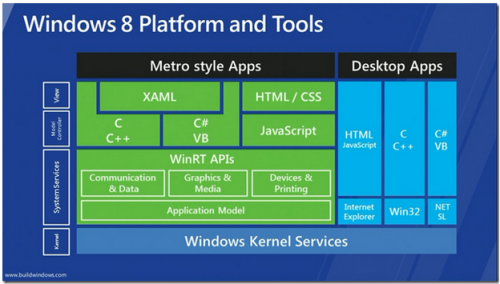Will Microsoft's developers make the WinRT platform leap?

It's been months (almost 11) since Microsoft introduced its new developer platform, anchored by the WinRT application programming interfaces, at the Build conference in September 2011.
That updated dev platform looked like this (insert your favorite version of this slide here):

Microsoft may be gearing up to share more about this platform at its upcoming Build 2012 conference at the end of October, but in the interim, the researchers at Forrester have delivered a state-of-the-state report on Microsoft's new dev platforms, generated by interviews with enterprise and third-party software developers.
At the crux of the Forrester report published August 24 (20 pages, $499 for non-clients) -- "The Future Of Microsoft .NET: New Options, New Choices, New Risks" -- is the key question: Can Microsoft make another big platform leap?
Forrester's answer:
"Yes, but the odds are long. With Windows 8, Windows RT, .NET Framework 4.5, and Windows Azure, Microsoft has reached its latest existential moment. So much of Microsoft’s future growth and profitability is tied to the success of this platform, and the obstacles to success with Windows 8 and WinRT, and to some degree Windows Azure, are great. This is a shift that Microsoft must get right or face serious constraints on its growth in future years."
Forrester's report includes a diagram (included below) which highlights some of the many changes to which Microsoft's core developer base is having to adjust.
Interestingly, Forrester puts the WinRT application programming interfaces (APIs) in the "speculative" category, along with OData and PLINQ. Not so surprisingly, Silverlight, Windows Presentation Foundation (WPF) and WinForms are all in the "on their way out" category.
Given I myself just interviewed a few business-app developers grappling with Windows 8 and WinRT, I found the section of the report -- based on 14 "vendor and user company interviews" that supplement the "dozens of client conversations" on Microsoft's platform that Forrester has every month -- to include other noteworthy insights.
Forrester's researchers said "established" independent software vendors (ISVs) are running about two years behind Microsoft in terms of adopting new frameworks and ideas. Many of these ISVs tend to use as little of Microsoft's framework as possible in order to hedge against regular changes Microsoft makes to its core set of APIs (see Silverlight and WPF). There are also some questions in the minds of those Forrester surveyed about Microsoft's long-term commitment to its own C# language, given the Windows Developer Division's emphasis on HTML, CSS, JavaScript and C++.
"Many .NET ISVs insist on clients not tied to .NET," the Forrester report noted. "The .NET ISVs we spoke with were highly committed to .NET on the server, including Azure. But they were much less loyal to any individual client technology, even the many provided by Microsoft."
At the same time, a number of ISVs have been investing in either native or hybrid HTML5 mobile clients, Forrester said. "WinRT must compete for a place in the ISV’s client pantheon and will earn a place only if Windows 8 is widely adopted," Forrester added.
Microsoft's Developer Division will be holding a virtual launch of Visual Studio 2012, which was released to manufacturing in late July, on September 12. According to the agenda, Microsoft execs will be providing more details on building Windows 8/Metro/modern apps -- which the Developer Division officials seem to prefer to call "Windows Store" apps -- with Visual Studio 2012. Also on the launch day agenda are .Net 4.5, Workflow Foundation 4.5, Windows Communication Foundation 4.5, Entity Framework 5, and Visual C++ 2012. Who knows: Maybe there will be an update or even code for those awaiting the promised software development kit for Windows Phone 8, too.